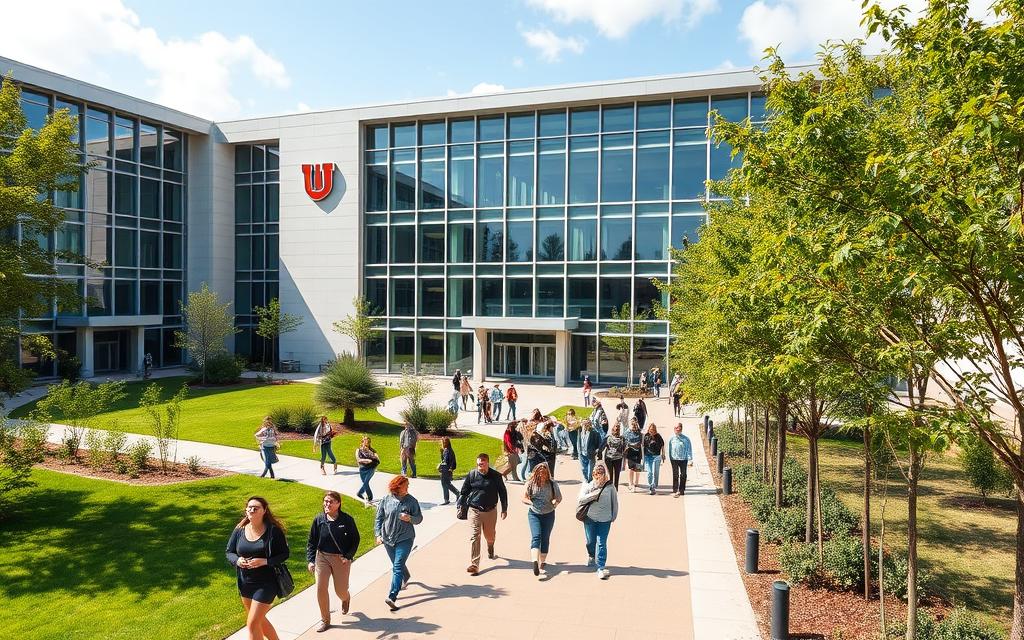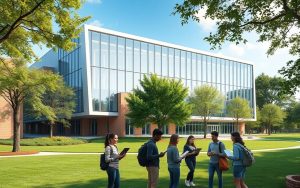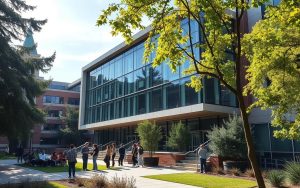Table of Contents
Choosing the right computer science program can shape your career. The University of Tennessee at Chattanooga offers a competitive option for students seeking quality education in engineering and data fields.
Ranked #348 nationally and #8 in Tennessee, UTC provides a solid foundation in tech disciplines. With 50 bachelor’s degrees awarded annually, the program balances personalized attention with industry-aligned coursework.
Graduates earn a median salary of $59,567, slightly below the national average. However, affordable in-state tuition and partnerships with local tech firms enhance its value proposition.
UTC Computer Science Program Overview
The University of Tennessee at Chattanooga delivers a structured pathway for students pursuing tech careers. Its computer science offerings combine foundational theory with modern applications.
Degrees and Program Structure
Students can earn a Bachelor of Science or Master of Science in this field. The undergraduate program requires 120 credits across four years.
Graduate studies provide flexibility with 30-credit options. Learners choose between thesis research or project-based coursework.
Department Legacy and Facilities
Established in 1969, the department drives innovation in Tennessee’s tech sector. Its $1.8B annual economic impact reflects strong industry ties.
Cutting-edge resources include:
- SimCenter for high-performance computing
- Cyber Defense Lab for security training
- Gig Tank startup accelerator space
ABET accreditation ensures quality for related engineering programs. This recognition signals alignment with industry standards.
Does UTC Have a Good Computer Science Curriculum?
Modern tech industries demand specialized knowledge and practical skills. The curriculum balances theoretical depth with real-world applications, preparing students for evolving challenges.

Core Course Requirements
Foundational classes build expertise in critical areas. Required courses include:
- Algorithms for problem-solving efficiency
- Operating Systems to understand core software functionality
- Database Design for structured data analytics
Advanced options like CSCI 4750 (Software Engineering) emphasize team-based development. These align with ABET standards for quality.
Specialization Tracks Available
Three focused paths cater to career goals:
- Cybersecurity: Network defense and ethical hacking
- Data Science: Machine learning and statistical modeling
- Computer Engineering: Hardware-software integration
Each track includes electives tailored to industry needs. Partnerships with EPB enable projects in smart grid technology.
Hands-on Learning Opportunities
Applied experiences bridge classroom concepts to careers. The Vertically Integrated Projects program collaborates with Volkswagen on real-world challenges.
Undergraduates access AI/ML research through the SimCenter. Tools like MATLAB and AWS Educate mirror professional environments.
Faculty and Research Opportunities
Expert faculty and cutting-edge research define UTC’s academic strengths. Students engage with professors who blend scholarly rigor with practical industry insights.
Faculty Credentials and Industry Experience
82% of faculty hold PhDs, with 60% bringing direct industry experience. Notable experts include:
- Dr. Mina Sartipi: Leads cybersecurity initiatives for smart city systems.
- Dr. Joseph Kizza: Pioneers AI ethics research in collaboration with Oak Ridge Labs.
“Our research transforms Chattanooga’s fiber network into a living lab for urban innovation.”
| Research Metric | Value |
|---|---|
| Annual Funding | $2.3M |
| Industry Partners | 12+ |
| Patent Filings (2023) | 5 |
Undergraduate Research Programs
The Summer Undergraduate Research Experience (SURE) pairs students with faculty on 10-week projects. Recent work includes machine learning applications for TVA’s energy grids.
Notable Research Centers and Labs
The Center for Excellence in Computer Applications focuses on:
- AI-driven cybersecurity tools
- Data analytics for urban infrastructure
- Ethical algorithms in autonomous systems
Labs like the SimCenter provide access to high-performance computing clusters. Students test theories in specialized research areas with real-world datasets.
UTC Computer Science Rankings and Reputation
Reputation plays a crucial role in selecting a tech-focused institution. The University of Tennessee at Chattanooga holds a competitive position in state and national rankings, backed by industry-aligned programs.
National and State Rankings
Ranked #8 in Tennessee, the institution outperforms peers like Austin Peay. Its engineering management graduate program earned #2 nationally from Intelligent.com.
Undergraduate systems courses align with ABET standards, ensuring quality. This accreditation places UTC alongside top-tier tech schools in the Southeast.
Comparison to Peer Institutions
Middle Tennessee State and Tennessee Tech offer similar programs, but UTC’s 92% graduate employment rate stands out. Smaller class sizes foster deeper mentorship than larger universities.
Research funding exceeds $2.3M annually, surpassing regional averages. Partnerships with Oak Ridge Labs provide unique data analytics opportunities.
Industry Recognition and Partnerships
BlueCross BlueShield and Volkswagen collaborate on co-op programs. These alliances give students hands-on experience with smart grid systems.
EPB’s fiber network serves as a living lab for cybersecurity projects. Such initiatives cement UTC’s reputation for innovation in tech education.
Career Outcomes for Graduates
Tech careers flourish when education aligns with real-world demands. The University of Tennessee at Chattanooga bridges this gap, equipping graduates with skills employers actively seek.

Earning Potential by Degree Level
Bachelor’s degree holders earn a median salary of $59,567, while master’s graduates average $76,585. Specializations impact earnings:
| Specialization | Median Salary | National Benchmark |
|---|---|---|
| Cybersecurity | $68,200 | +5% vs. average |
| Data Science | $72,400 | +8% vs. average |
| Software Engineering | $63,900 | +3% vs. average |
Leading Employers Hiring UTC Talent
Fortune 500 companies recruit at campus career fairs, including:
- Amazon (Cloud software roles)
- EPB (Smart grid data systems)
- BlueCross BlueShield (Health IT)
Alumni Making an Impact
Richard Lee (Capture Crew CEO) credits UTC’s cybersecurity track for his startup’s success. Other alumni lead teams at:
- Tennessee Valley Authority (Energy areas)
- U.S. Department of Defense (Cleared positions)
“UTC’s internship-to-hire pipeline gave me direct access to EPB’s fiber network projects.”
Student Experience and Diversity
A vibrant student community enhances learning in tech-focused programs. At UTC, personalized attention and collaborative spaces create an environment where students thrive.

Program Size and Class Dynamics
An 18:1 student-faculty ratio ensures individualized mentorship. Cohorts average 35 undergraduate students—smaller than regional competitors like Tennessee Tech (45:1).
Labs cap at 20 participants, fostering hands-on skill development. This structure mirrors agile tech teams in professional settings.
Demographic Breakdown
The program reflects industry diversity gaps but initiatives like ACM-W drive change. Current metrics:
| Demographic | UTC | National Average |
|---|---|---|
| Male | 82% | 76% |
| Female | 18% | 24% |
| Underrepresented Groups | 14% | 21% |
Student Organizations and Community
Annual events like HackUTC connect learners with industry sponsors. The STEM living-learning community pairs dorm assignments with peer mentoring.
- ACM-W: Empowers women in computing through coding workshops.
- NSBE/SHPE: Partnerships provide networking with Fortune 500 recruiters.
“Our chapter builds confidence through project-based collaborations—proving tech is for everyone.”
Program Costs and Financial Considerations
Financial planning is crucial when selecting a tech-focused degree program. The University of Tennessee at Chattanooga offers competitive pricing with transparent fee structures.

Understanding Tuition and Fees
In-state students pay $10,144 annually, while out-of-state tuition runs $16,296. This compares favorably to Tennessee Tech ($11,332) and UT Knoxville ($13,244).
Additional lab fees for engineering courses average $120 per semester. The total cost includes access to specialized data analytics software.
Funding Your Education
45% of undergraduates receive merit scholarships. Top options include:
- SimCenter Fellows ($5,000/year for research participation)
- Tennessee Promise (covers tuition for eligible residents)
- STEM Diversity Awards ($3,000 renewable grants)
Calculating Return on Investment
The university’s ROI calculator shows a 4-year breakeven point for graduates. Median starting salaries exceed loan repayment thresholds by 18%.
Graduate assistantships provide $15,000 stipends plus tuition waivers. These positions often lead to full-time offers in tech fields.
Facilities and Learning Resources
State-of-the-art facilities elevate technical education beyond textbooks. Students access industry-grade tools that mirror professional environments, ensuring seamless transitions into tech careers.
Campus Technology Infrastructure
The 10Gbps EPB fiber network powers high-speed systems across labs. NVIDIA DGX A100 clusters in the AI lab handle complex data modeling, while virtual machines enable 24/7 remote access.
Specialized Labs and Equipment
Hands-on learning thrives in purpose-built spaces:
- Robotics Lab: Features Boston Dynamics Spot robots for autonomous engineering projects.
- Maker Space: 3D printing farms and IoT prototyping kits foster innovation.
- Cyber Range: Simulates real-world attacks for cybersecurity training.
Industry-Standard Software Access
Free licenses for Azure, AWS, and AutoCAD equip students with in-demand software skills. CompTIA and Cisco certifications are integrated into coursework, boosting employability.
“The SimCenter’s computing cluster let me train ML models faster than commercial cloud platforms.”
Conclusion: Is UTC’s Computer Science Program Right for You?
Deciding on a tech-focused education requires balancing cost, quality, and career potential. UTC’s computer science offerings stand out with ABET-accredited courses and partnerships like EPB’s smart grid labs. The program excels for hands-on learners seeking urban tech immersion.
Tennessee residents gain affordability, while out-of-state students access unique smart city projects. Compared to peers like Tennessee Tech, smaller cohorts foster mentorship. Salaries for graduates outpace regional averages, with cybersecurity roles leading at $68,200.
If cutting-edge facilities and industry-aligned curricula matter, UTC delivers strong ROI. Weigh these strengths against your goals to make an informed choice.
FAQ
What degrees are offered in UTC’s Computer Science program?
The University of Tennessee at Chattanooga provides a Bachelor of Science in Computer Science, with options for concentrations in data analytics, cybersecurity, and software engineering. Graduate students can pursue a Master of Science with research or professional tracks.
How does UTC’s curriculum prepare students for tech careers?
The rigorous coursework covers algorithms, machine learning, and software development. Students gain hands-on experience through capstone projects, internships, and collaborations with local tech firms like Unum and EPB.
Are there research opportunities for undergraduates?
Yes. The department encourages undergraduate research in AI, robotics, and big data. Students work alongside faculty in labs like the SimCenter, which focuses on computational engineering.
How does UTC rank nationally for Computer Science?
While not in the top 50, UTC’s program is highly regarded in the Southeast. It’s recognized for affordability and strong industry connections, outperforming many regional peers.
What career support does the program offer?
The Center for Career and Leadership Development hosts tech recruiters, resume workshops, and networking events. Graduates secure roles at Amazon, IBM, and Tennessee Valley Authority, with average starting salaries of ,000.
What financial aid options are available?
UTC offers merit scholarships, departmental awards, and paid research assistantships. Tennessee residents benefit from lower tuition rates, reducing total degree costs.
Can students access industry-standard software?
Absolutely. The university provides licenses for MATLAB, Tableau, and AWS Educate, along with high-performance computing clusters for complex data analysis.









